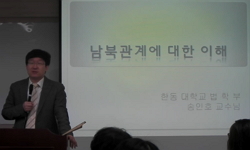탈냉전적 국제질서속에서 김대중 정부의 대북포용정책을 계승했다고 할 수 있는 노무현정부의 평화번영정책은 금강산관광과 개성공단사업등을 통해 북한과의 교류증진을 위해 많은 노력...
http://chineseinput.net/에서 pinyin(병음)방식으로 중국어를 변환할 수 있습니다.
변환된 중국어를 복사하여 사용하시면 됩니다.
- 中文 을 입력하시려면 zhongwen을 입력하시고 space를누르시면됩니다.
- 北京 을 입력하시려면 beijing을 입력하시고 space를 누르시면 됩니다.

노무현 정부와 이명박 정부의 대북정책 결정요인 비교연구 = Comparative Study on the Roh Moo-hyun and Lee Myung-bak Administration’s Factors of Decision-Making in Policy towards North Korea: Application of James Rosenau’s Model
한글로보기https://www.riss.kr/link?id=A108198082
- 저자
- 발행기관
- 학술지명
- 권호사항
-
발행연도
2015
-
작성언어
-
-
주제어
탈냉전적국제질서 ; 대북포용정책 ; 평화번영정책 ; 상호주의 ; 대북강경정책 ; 남북관계 ; 군사적충돌 ; 외교정책 결정모델 ; the world order of the post-cold war era ; Engagement Policy ; Peace and Prosperity Policy ; reciprocity ; hard-line policy towards North Korea ; inter-Korean relationship ; military conflicts ; and model of decision-making in foreign policy
-
KDC
309
-
등재정보
KCI등재후보
-
자료형태
학술저널
-
수록면
125-158(34쪽)
- 제공처
-
0
상세조회 -
0
다운로드
부가정보
국문 초록 (Abstract)
탈냉전적 국제질서속에서 김대중 정부의 대북포용정책을 계승했다고 할 수 있는 노무현정부의 평화번영정책은 금강산관광과 개성공단사업등을 통해 북한과의 교류증진을 위해 많은 노력을 했다. 이 결과 북한에 일방적인 지원만 했다는 비판도 적지 않으며 북한을 시장경제체제로의 개혁과 개방으로 이끌어내는데도 실패했다는 평가를 받고 있다. 이명박 정부는 노무현 정부의 평화정책을 백지화하고 상호주의에 입각한 대북강경정책을 추진했다. 그렇지만 이명박 정부의 대북정책도 군사적 충돌등 남북관계를 과거보다 더욱 악화시켰다는 지적이 많다. 이러한 상황을 염두에 두고서 본 연구는 남북관계가 탈냉전적 국제질서 변화와 상관없이 남한에서 어떠한 성격의 정부가 들어서느냐에 따라 갈등과 협력이 반복되는 이유가 무엇인지를 알아보고자 한다. James Rosnau의 외교정책 결정모델을 적용해서 두 정부의 그러한 외교정책 결정에 영향을 미친 요인이 무엇인지를 비교분석했다. 그 결과 노무현 정부의 대북 정책 결정에는 개인적 요인이 가장 큰 영향을 미쳤고, 정부적 요인과 사회적 요인 순으로 영향을 미친 것으로 분석되었다. 반면, 이명박 정부는 사회적 요인, 개인적 요인, 정부적 요인 순으로 영향을 미친 것으로 드러났다.
다국어 초록 (Multilingual Abstract)
In the world order of the post-cold war era, the Roh Moo-hyun administration’s Peace and Prosperity Policy toward North Korea was the continuation of the Kim Dae-jung administration’s engagement policy toward the North. Under this policy, The Roh ...
In the world order of the post-cold war era, the Roh Moo-hyun administration’s Peace and Prosperity Policy toward North Korea was the continuation of the Kim Dae-jung administration’s engagement policy toward the North. Under this policy, The Roh administration put much effort to promote exchanges between South and North Korea through projects such as the Mount Kumgang Tourism Zone and the Kaesong Industrial Complex. Consequently, many criticize his policy, arguing it provided unreciprocated assistance to the North. It is also considered a failure since it could not induce North Korea to open and reform its economy towards a market economy. The Lee Myung-bak administration revoked the former president’s Peace and Prosperity Policy and took a hard-line policy towards North Korea based on the principle of reciprocity. Yet, many point out that the policy of the Lee administration also aggravated the relationship between South and North Korea as seen in the cases of military conflicts, etc. In this regard, this paper will look into why we see cooperation or conflict in the inter-Korean relationship one after the other depending on the character of the government in South Korea, regardless of the changing world order of the post-cold war era. I used James Rosenau’s model of decision-making in foreign policy to compare and analyze the factors of the two administrations which influenced their foreign policies. As a result, the research concluded that personal factor had the greatest impact on Roh administration's policy toward North Korea, followed by governmental factor and social factor. Lee administration's policy was most greatly influenced by social factor, followed by personal factor and governmental factor.
목차 (Table of Contents)
- Ⅰ. 서론
- Ⅱ. 노무현 정부의 대북정책
- Ⅲ. 이명박 정부의 대북정책
- Ⅳ. 결론: 요약 및 평가
- Ⅰ. 서론
- Ⅱ. 노무현 정부의 대북정책
- Ⅲ. 이명박 정부의 대북정책
- Ⅳ. 결론: 요약 및 평가
동일학술지(권/호) 다른 논문
-
- 성신여자대학교 동아시아연구소
- 김영환(younghwan Kim)
- 2015
- KCI등재후보
-
한국의 대 동남아 외교 전략과 정책분야별 방안에 관한 구상
- 성신여자대학교 동아시아연구소
- 윤진표(Jinpyo Yoon)
- 2015
- KCI등재후보
-
- 성신여자대학교 동아시아연구소
- 성민주
- 2015
- KCI등재후보
-
- 성신여자대학교 동아시아연구소
- 김강녕(Kang-nyeong Kim)
- 2015
- KCI등재후보




 스콜라
스콜라






